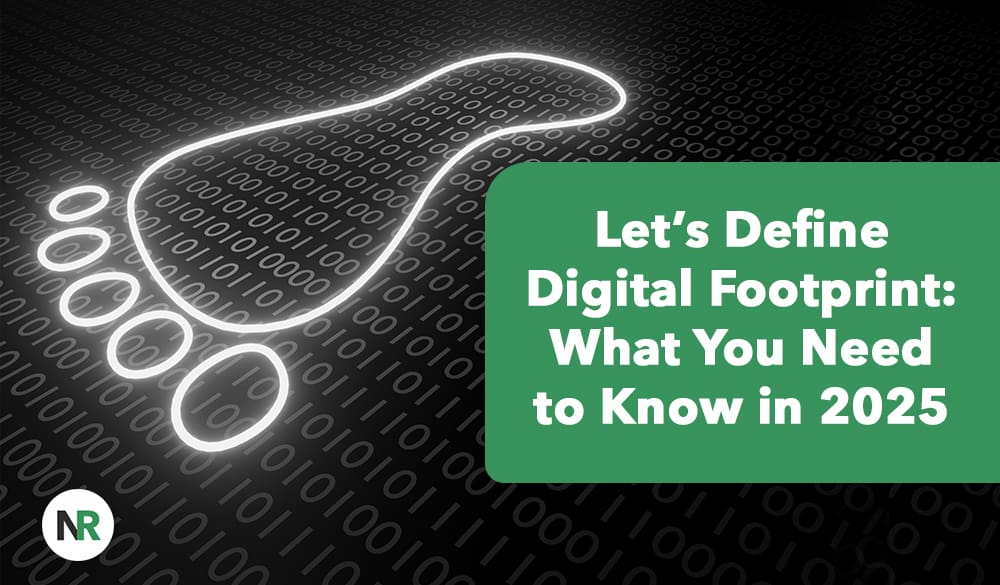When you define digital footprint, you unlock the potential of your online presence to build brand awareness and shape the public perception of you or your business.
In our everyday lives, we spend a lot of time on the web. Most people use search engines, social media sites, and web browsing to learn about the people and places around them.
Whether we’re on mobile devices or at the office on a desktop computer, every action we take online leaves a traceable digital footprint.
What is a digital footprint, though, and how can it provide advantages? What can you do to ensure a positive, visible online presence? In this guide, we’ll share all the details you need.
NetReputation provides information and services to help you protect your digital presence. Call us at 844-461-3632 to learn more, or fill out the contact form below for a free consultation.
Request a Free Consultation
What Is a Digital Footprint?
The term “digital footprint” is defined by multinational cybersecurity firm Kaspersky as “the trail of data you leave when using the internet.”
These footprints are also sometimes referred to as your “digital shadow.” This trail of data may be intentional, such as posting comments on social media platforms or publishing blogs. However, any activity you conduct on the web leaves a data trail, whether you intend to or not.
To expand the definition of digital footprint, cybersecurity experts include every activity, action, communication, or contribution a person produces when using the internet or digital devices. In simple terms, your online activities and actions are leaving digital tracing data that create a unique set of data points for each digital user.
Pros and Cons of a Digital Footprint
Digital footprints can apply to people as well as businesses or organizations. As with any tool on the internet, there are both positive and negative consequences associated with digital footprints.
Digital Footprint Pros
- Digital footprints improve brand awareness.
- Your footprint can create and enhance connections between you and others, particularly on social media sites.
- These footprints can be profitable by attracting social media influencers and customers to your digital properties.
- Retailers can develop customized advertising materials based on consumer browsing habits, helping to improve the return on advertising investments.
Digital Footprint Cons
- Every action you make online influences your digital footprint, whether you like it or not.
- These footprints have the potential to be used against you, especially by cybercriminals who can use sensitive data to commit identity crimes.
- A data breach committed by exploiting vulnerabilities in a banking or healthcare system can unlock confidential information, exposing people to fraudulent activities.
- Digital footprints put your privacy at risk, allowing anyone to track your digital activities with a few clicks of a mouse.
In today’s highly connected and always-on digital environment, it’s all but impossible not to leave traces of your activities online. Because of this, having a positive online presence is increasingly important.
The Value of a Positive Digital Footprint
How can a positive digital footprint help you? There are several important ways that your online presence can provide certain advantages in your personal or professional lives.
For starters, every day, people are using the web to learn about others. If you’ve ever applied for a job, contacted a bank for a loan, or created a profile on a dating site, chances are that someone has used Google or one of the other major search engines to find details about you.
Businesses rely on their digital footprints to attract new customers and refine their brand images. With a robust digital presence, continued success and growth are possible. After all, a visible and discoverable footprint allows customers to easily access the information they need to make purchasing decisions with your company.
Moreover, potential employers and financial institutions use search results to conduct informal background checks on people. The information in search results can have a profound impact on your ability to achieve your goals. That’s why a positive digital footprint is so critical.
Other benefits of having a strong and positive online footprint include:
- Improved visibility in search engine results
- Greater awareness of your brand
- Ability to control the online narrative
As your digital footprint grows, so too does your online visibility. A large digital footprint — one that is positive and engaging — puts you in front of the people who matter most: decision-makers who can help you achieve your goals.
Individuals and businesses often use online reputation management (ORM) to shape public perceptions, which rely heavily on a positive image in the digital environment. At NetReputation, we work with individuals and businesses to help them build and take control of their online reputation. Give us a call at 844-461-3632 to learn more.
Digital Footprint Examples
So far, we’ve learned what digital footprints are and how they can provide benefits to you or your company. Now it’s time to dive a bit deeper into what makes up your digital footprint. There are two major classes or categories of the digital footprint: active and passive. Let’s discuss them.
Active Digital Footprint
An active digital footprint is the deliberate set of actions a person or company takes to share details online. In other words, active digital footprints are created and maintained willingly, such as by:
- Being active on social media
- Launching websites or other web properties
- Contributing to an online news source
- Regularly publishing news articles and blog posts
- Making intentional changes to your digital presence
In regard to the last point, those intentional changes may be establishing your social media credentials, uploading videos to social media platforms, or updating personal or business websites.
Passive Digital Footprint
In contrast to an active footprint, a passive digital footprint is that which develops in the background. Every action you take online leaves a trace, from logging onto public networks and visiting unsecured sites to accessing medical records or financial details from a mobile banking app or buying something online. The list is nearly endless.
Your electronic footprint is stored on every online database you connect to, from personal sites to shopping sites, mobile apps, and more. Some of the biggest culprits when it comes to having a negative passive footprint are visiting unsafe websites. These websites install cookies that track your movements.
Overall, it’s important to understand that when you’re browsing websites or conducting any other online activities, there are devices logging your every move.
Because passive digital footprints are beyond your control, they can often be used against you. Imagine if a criminal were to track your online activity, allowing them to gain access to your personal financial or medical records. If your records fall into the wrong hands, criminals may be able to impersonate you, potentially putting your safety and security at risk.
Developing a Robust Digital Presence
Your digital footprint can provide you with significant advantages in the digital environment. How can you get the most from your footprint, allowing you to reach your personal and professional goals?
The answer is in online reputation management (ORM) services. A reputation management firm can help you establish a robust online presence through:
- Reputation analysis
- Web property development
- Content creation and promotion
- Reputation monitoring
- Negative content removal
Think of ORM as an extension of your digital marketing efforts. Reputation management not only helps you improve visibility in the digital environment, but it can help protect and repair your reputation, too. On the internet, your digital reputation is one of the most valuable assets you have. Make it a positive one with the help of a reputation management team.
Controlling Your Data Trail: Private Data Protection Tips
Your data is being collected and stored every time you use the internet or a mobile device, like a smartphone or tablet. How can you minimize the negative impacts of a digital footprint that is mostly beyond your control?
Here are some tips to protect your digital privacy:
- Practice good data hygiene. In other words, think carefully about the information you share in social groups and on digital platforms. Don’t announce your vacation plans as part of your Facebook status update, for example. Criminals may use that information to target your home or office while you are away.
- Be careful on unsecured public Wi-Fi networks by using a virtual private network (VPN) whenever possible.
- Payment details are a target for thieves. Be sure when making online purchases that you are on a secured network and use a secure retailer shopping cart.
- Delete old accounts promptly. Even older accounts, such as banking or social media, can share details like your phone numbers, email addresses, and account numbers without your knowledge.
- Pull your credit reports and financial records to review them regularly. By periodically reviewing these reports, you can spot fraudulent activity before it can cause damage. Take action immediately if you see any accounts you didn’t open or other activities that indicate a data breach.
Keep this in mind: In 2023, more than 880,400 internet scam complaints were received, resulting in $12.5 billion in losses. Phishing, personal data breaches, extortion and identity theft fall within the top eight types of internet crimes reported.
Contact NetReputation to Learn More
At NetReputation, we provide a broad range of services to individuals and businesses who want to create, grow or repair their digital reputation. Whether you’re prioritizing your personal or professional online reputation, our solutions and team of experts can help.
Our ORM services include content removal, review management, branding, content creation and more. It’s time to take back control of how people perceive you online so you can attract the opportunities you deserve.
We offer ORM solutions for individuals as well as businesses. Get started today with a free consultation with one of our experts. Call us at 844-461-3632 or fill out the contact form below.
Request a Free Consultation




